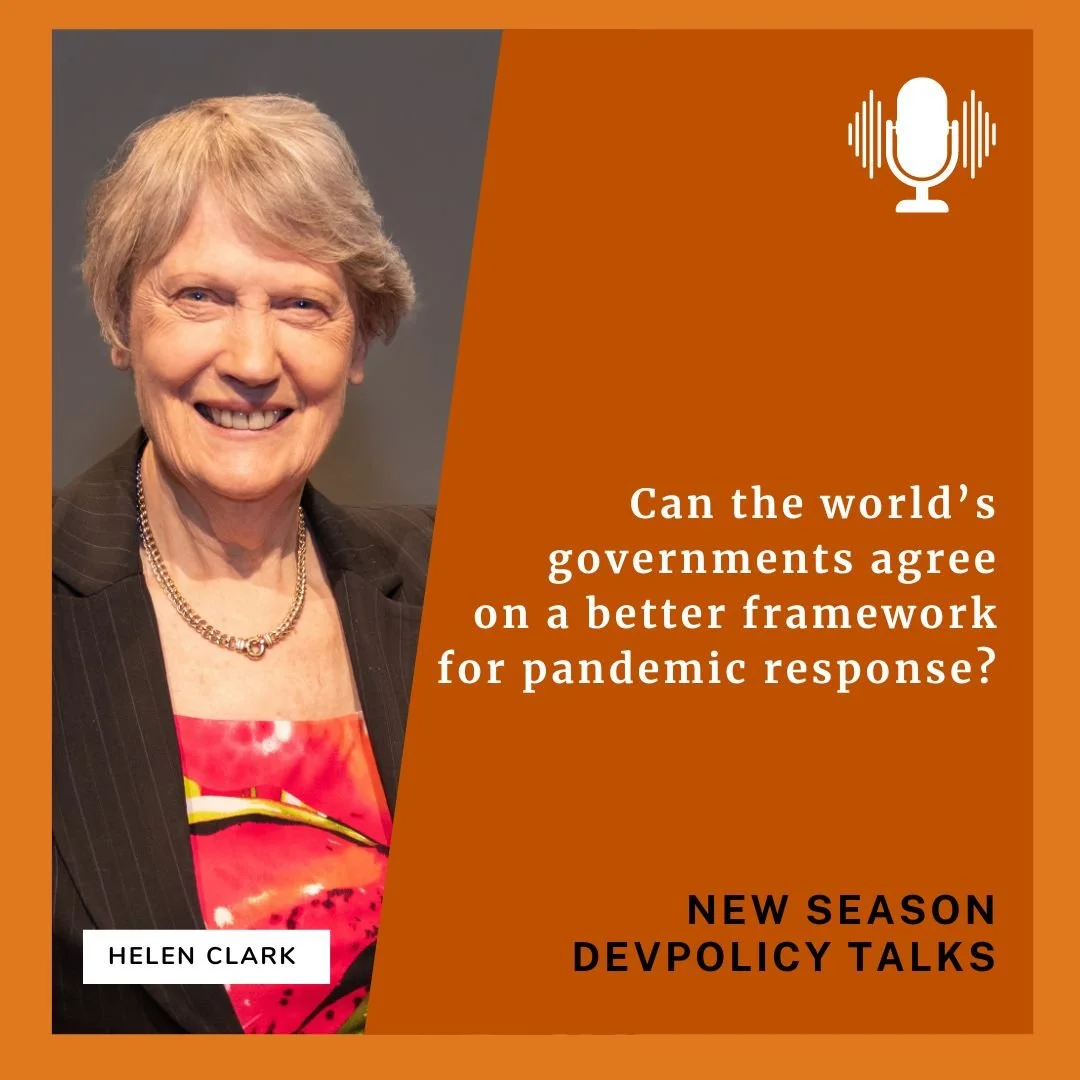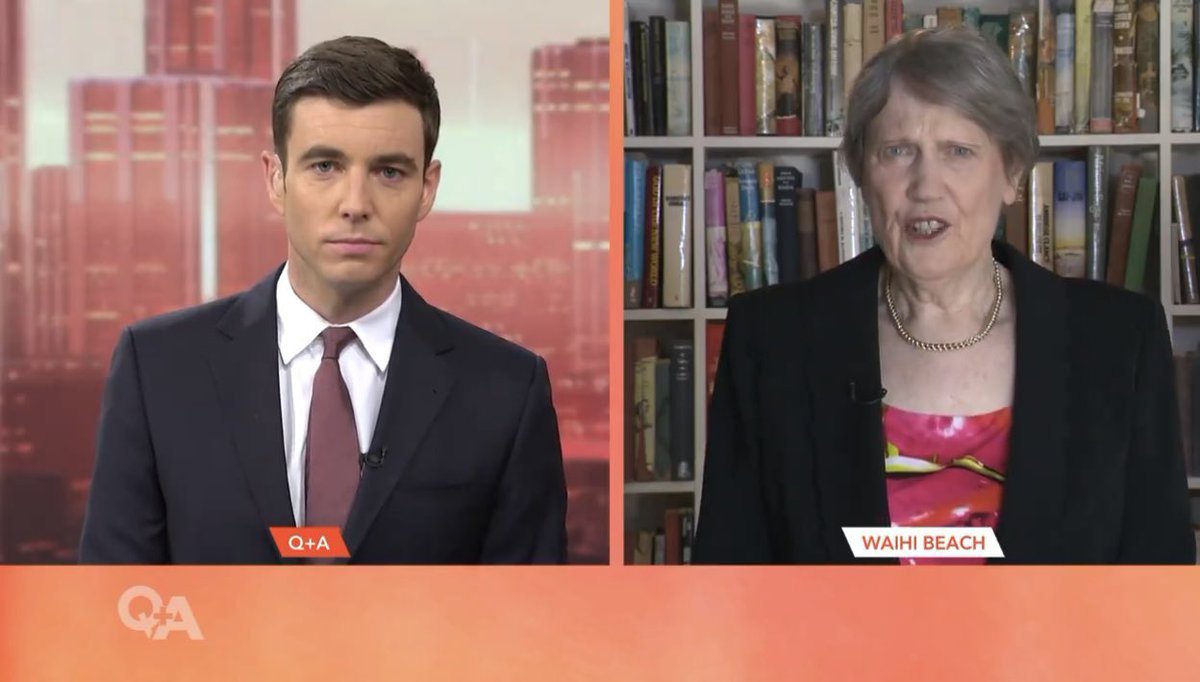Helen Clark's Diary - April
Please sign up with your email to receive Helen Clark’s Diary directly into your mailbox.
Women’S leadership
WomenLift Health conference for gender equality
In April I travelled to Dar Es Salaam for the global conference of WomenLift Health. I sit on the advisory board of this organisation dedicated to supporting women to rise to leadership positions in global health with the aim of achieving gender equality in those positions. The organisation has hubs in Eastern and Southern Africa, South Asia, and North America. The conference brought together many alumnae of WomenLift Health's programmes and many other stakeholders in global health. I was on a panel on leadership with former Tanzanian President Jakaya Kikwete, a colleague since we first met at a Commonwealth Heads of Government Meeting in 2007, and a strong supporter of United Nations and other public good initiatives.
natural resource management
Extractives sector best practice governance meeting in Tanzania
Tanzania is a member of the Extractive Industries Transparency Initiative. During my visit to Dar Es Salaam in April, I met with the President of Tanzania, Her Excellency Samia Suluhu Hassan, with ministers, the Tanzania EITI Multi-Stakeholder Group, and civil society to discuss the country's ongoing implementation of the EITI Standard on best practice governance in the extractives sector. Our discussions focused on the Tanzanian Government's priorities for the extractive sector and how the EITI could actively support ongoing governance reforms within Tanzania's oil, gas, and mining industries.
The President reiterated her commitment to the implementation of EITI Standard in Tanzania. She expressed strong support for advancing good governance in the extractive sector, emphasising the importance of transparency and accountability for the benefit of all Tanzanians. "My government is fully committed to implementing the 2023 EITI Standard. We firmly believe that transparent and accountable governance of our extractive resources will significantly contribute to achieving our development priorities as we strive to become an upper-middle-income country in the coming years", she said.
Pandemic preparedness
Is the world ready for the next pandemic?
This year the regional meeting of the Berlin-based World Health Summit was held in Melbourne in April with Monash University as a key partner. I participated in sessions on geopolitics and health, pandemic preparedness and response, and drug policy reform. I was also on a panel at a master class on leadership organised by Sandro Demaio of VicHealth - Victoria's public health agency. While in Melbourne, Peter and I met with the Grattan Institute, a public policy think tank with synergies with The Helen Clark Foundation.
WEBINAR RECORDING
WEBINAR RECORDING: Pathway to Prosperity
Earlier this month I spoke with Paul Polman, former Chief Executive of Unilever about how the New Zealand food and fibre sector can meet changing international expectations around sustainability in its production and supply chains.
This public webinar marked the launch of a discussion paper, Pathways to Prosperity: Capturing more of the value of our food and fibre sector exports for New Zealand, commissioned by the The Helen Clark Foundation from the NZ Institute of Economic Research (NZIER),
PODCAST
We need a better framework for pandemic response
“The failings of the international system in the face of the pandemic were multiple. But if we go to the most important, I think the lack of timely reporting, of what we were dealing with was very damaging. It shouldn't have taken a month to get to a Public Health Emergency of International Concern declaration. Having said that, there was another very major failing, which was in essence, that most countries took very little notice of the Public Health Emergency of International Concern declaration right through the month of February. It was as if this COVID outbreak was something that was happening somewhere else far away. And like other threats that hadn't materialised globally, whether it be SARS or a particular variety of avian flu, people watched it with interest on their television screens. It wasn't, I think, until the tragedy unfolded in the north of Italy, that a lot of the Western world woke up. But, by then, COVID was so fully on the move that what played out, became inevitable. So there were two last months, January and February when more could have been done and stop it in its tracks.”
Israel - Palestine War
UN’s Formal UNRWA Inquiry
The inquiry made useful recommendations to ensure UNRWA’s political neutrality. Israel did not provide the inquiry with evidence of the allegations it had made against UNRWA. Those countries which suspended funding to #UNRWA should reinstate it immediately; lives literally depend on that. The Guardian.
US vetoed UN membership for State of Palestine
The US vetoed a UN Security Council Resolution which would have given the State of #Palestine full membership of the United Nations. No other country on the 15-member Council voted against. What will it take for the US to move on this? Aljazeera.
Covid 19
Latest Pandemic Agreement draft
The new pandemic accord negotiating text is now being negotiated: it seeks to bank agreement reached up until now, with outstanding issues to be resolved through ongoing processes which are yet to be determined. Will this approach survive the meeting of the Intergovernmental Negotiating Body (INB) which resumed on 29 April? The Health Policy Watch.
NEW ZEALAND
The Government is reinstating the Three Strikes legislation
Reinstating “3 strikes and you are out” will have one certain outcome: driving up prison numbers and spending on incarceration. The money would be better spent on the rehabilitation and reintegration of prisoners. Newshub.
Fast-tracking infrastructure projects
New Zealand’s proposed fast-track “law change would give three ministers - Chris Bishop, Simeon Brown, and Shane Jones - the ability to green-light roads, dams and mines, whether or not their approval is recommended by an expert panel, risks biodiversity, or has previously been denied consents by the courts”. Newshub has more.
The list of organisations which the New Zealand Government has approached about applying for fast-tracked consents needs to be compared with lists of those who donated to political parties in government or have other links to ministers. The potential for cronyism is high. The New Zealand Herald.
Fast-track could end as a dead-stop
New Zealand’s Parliamentary Commissioner for the Environment “warns fast-track Approvals Bill poses significant risks to the environment. It will, he says “achieve sub-optimal outcomes through poor decision making, poor allocation of resources, a lack of legislative durability and increased litigation risk, and will inevitably open the door to judicial review of ministerial decisions”. “He flags possibility that judicial reviews could turn fast-track into slow-track or even a dead-stop.” The Post.
Debate on Aukus in New Zealand.
In April, I participated in an event at Parliament on the problems inherent in New Zealand joining the proposed Pillar Two of the Aukus agreement. Aukus is a nuclear submarine technology agreement between the United States, the United Kingdom, and Australia. A proposed Pillar Two is believed to be likely to offer access to advanced military technologies. For some time, I have been questioning the wisdom of engagement with this. Does New Zealand need the technologies, and if it did - would they be available under existing procurement agreements. Would involvement lead to expectations of New Zealand spending more on defence, and participating more in, in effect, US-led military alliance activities? How would involvement impact New Zealand’s nuclear-free and independent foreign policy? How could it potentially affect trade with New Zealand’s largest trading partner, China, whose share of our trade is some 26%, roughly double that of our second trading partner in size, Australia. There are many unanswered questions.
WATCH MY INTERVIEW WITH JACK TAME ON TVNZ’S Q&A.
Heather du Plessis-Allan of The New Zealand Herald has also asked some basic questions about Aukus and the implications of New Zealand associating with it. No good reasons have been given by the Government to date, and the potential downsides of entanglement in a partnership aimed at major trading partner are obvious: The New Zealand Herald.
“The Aukus question: What could New Zealand really sign up for?”
Eight “advanced capabilities” areas to be progressed under #Aukus Pillar 2: undersea capability, quantum computing technology, artificial intelligence/autonomous tech, advanced cyber, hypersonic/counter-hypersonic weapons, and electronic warfare. Does New Zealand need this?
New Zealand is being drawn towards an Aukus Pillar 2 arrangement without transparency about potential costs in defence spending and in loss of trade when the AUKUS partnership is aimed at New Zealand’s major trading partner for which no replacement is readily apparent.
Aukus Pillar 1 shares nuclear-powered submarine technology between the US, UK, and Australia. Under New Zealand law, nuclear-armed submarines cannot enter New Zealand ports. Will the next step be pressure to weaken the 1987 nuclear-free legislation? Transparency is badly needed around government intentions. The Post has more.
Also worth reading is this important X thread from Professor @Robert_Patman of the University of Otago on Aukus and the adverse implications of joining Pillar 2.
More public sector cuts
Every day headlines scream of often very large job cuts in New Zealand public sector: today it’s the child welfare entity Oranga Tamariki which in its various forms over many years has struggled to ensure that children are safe. So, what exactly is being cut? The public needs more information about what services and functions are being eliminated in the New Zealand public sector. Is it policy and analysis? If so, that has long term implications for service delivery. Will professionals be doing their own admin? That means less time for their work. The New Zealand Herald.
SIGN THE PETITION
〰️
SIGN THE PETITION 〰️
PETITION: Save the Sea Lions!
New Zealand sea lions are an endangered species needing protection. But the Minister of Oceans/Fisheries has scrapped the limit on the number of New Zealand sea lions the fishing industry can kill. Sign petition to reinstate the mortality limit and support call for more protection!
THE LATEST FROM THE HELEN CLARK FOUNDATION
Crisis of confidence in New Zealand
Fascinating, deeply concerning analysis of a decline in New Zealanders’ confidence about our country and its prospects in the years ahead. Addressing and reversing this trend should be a central priority for politicians, business leaders and civil society. Newsroom.
Please sign-up to our free newsletter to receive updates about The Helen Clark Foundation’s latest work and public events.








